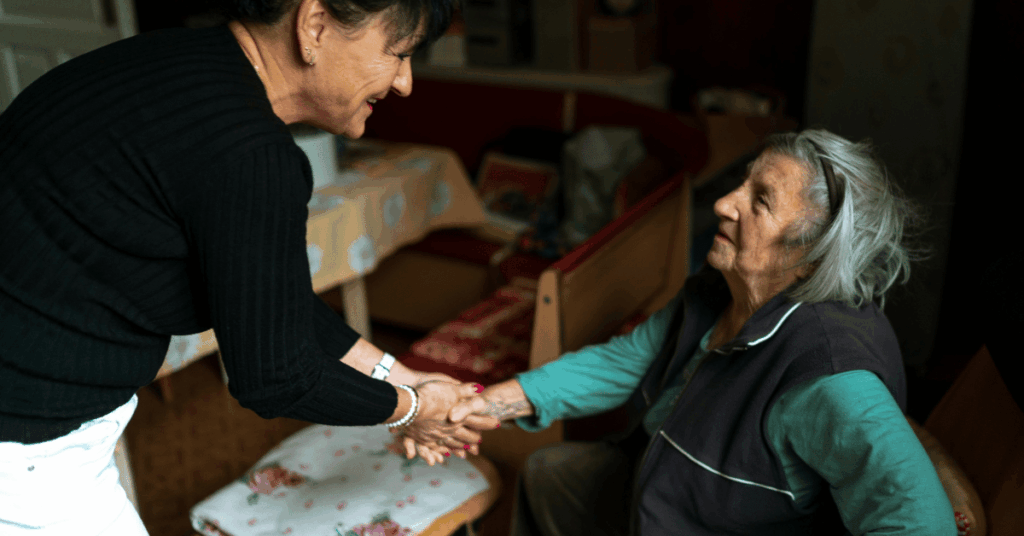“Agatha” had been living in a retirement home for several years. Her daughter, “Elise,” visited often and did her best to make sure her mom felt supported and connected. Lately, however, Elise noticed that her mom was becoming more forgetful, especially when it came to finding her way to the dining room downstairs for her meals.
The Behaviour, Through the Lens of Empathy
When Agatha gets confused and lost, she would call Elise, sounding very distressed and anxious over the phone.
“I don’t know what I’m supposed to be doing. I don’t know where I’m going.”
These calls broke Elise’s heart. Her mom sounded frightened and disoriented. Wanting to help, Elise arranged for a staff member to escort her mother downstairs during mealtimes. But when Agatha learned about this plan, she became upset and refused the assistance.
“I don’t need anyone coming to get me,” she said firmly. “It will look bad on me.”
A Creative, Compassionate Solution
Elise understood her mother’s pride and lifelong independence. Being helped, especially in front of others, made her feel embarrassed and singled out. So, Elise and the team found a gentle, creative approach.
Instead of assigning a “worker” to escort Agatha, Elise told her mother that a “friend” of hers, someone who also visited another resident, had offered to check in on her as a favour. That same “friend” could walk with her downstairs on her way to see someone else.
This small shift in approach made all the difference. Agatha no longer felt like a burden or a patient. She felt like a respected adult being helped by a friendly acquaintance, not “looked after” or supervised.
The Meaning Behind the Behaviour
Agatha’s refusal to accept help wasn’t about being stubborn; it was about dignity. She didn’t want to be seen as incapable or pitied. Her pride and independence were still deeply a part of who she was.
This behaviour is common among older adults living with dementia. It reflects the very human desire to maintain self-respect and control over one’s life. When caregivers take the time to look beyond the behaviour, they can find creative ways to honour both the person’s needs and their sense of self-worth.
Putting ourselves in their shoes helps us understand. We all have moments when we resist help, especially when it makes us feel exposed or dependent. Whether it’s after surgery, during illness, or simply needing assistance with something personal, it’s not easy to accept help when it touches our pride.
Beyond the Task and Preserving Dignity in Everyday Care
Just because a person begins to forget doesn’t mean they lose the right to dignity. We can, and must, find creative ways to work with them, not just for them. When we shift from task-focused care to person-focused care, we preserve what truly matters: identity, respect, and human connection.
As caregivers, it’s easy to focus on routines – bathing, grooming, feeding, changing, cleaning – because those are the visible needs. But if that’s all we see, we risk forgetting the whole person behind those tasks. When care becomes only about efficiency, compassion fatigue can quietly creep in.
However, when we focus not just on completing tasks but on preserving dignity, empowering another human being, and seeing their face soften with comfort and trust, something beautiful happens. The work becomes meaningful. The fatigue lessens. The bond deepens. You, as the caregiver, can help make this happen for the person you are supporting.
Every act of gentle understanding, every moment of creativity to preserve someone’s pride, adds light to their days. You are not just meeting physical needs, you are nourishing the human spirit.
Be the torch that lights this path, the path where caring goes beyond the physical, illuminating dignity, respect, and love in every action.
Free 20-Minute Consultation (for NEW Clients)
If you found this article helpful and if you’re worried about a loved one or a friend and aren’t sure where to turn, you’re not alone. We’re here to help! Reach out, and together we can brainstorm solutions tailored to your unique situation. Start by visiting our website at https://dementiasolutions.ca/private-consulting/ to schedule your free 20-minute consultation with one of our experienced Dementia Care Advisors. We’re here to support you every step of the way.
Dementia Solutions Family Support Membership
If you are a family caregiver to someone with dementia, then we invite you to join our Dementia Solutions Family Support Membership by clicking here. Gain access to interviews and videos of other dementia caregivers, access tools and resources, and support sessions led by our Dementia Care Advisors, and many more – exclusive for our members only.
DISCLAIMER:
This article is based on a true story; however, names, locations, and certain events have been altered to protect the privacy and confidentiality of the individuals involved. Any resemblance to actual persons, living or dead, or actual events is purely coincidental.
The contents of this blog are provided for information purposes only. They are not intended to replace clinical diagnosis or medical advice from a health professional.



